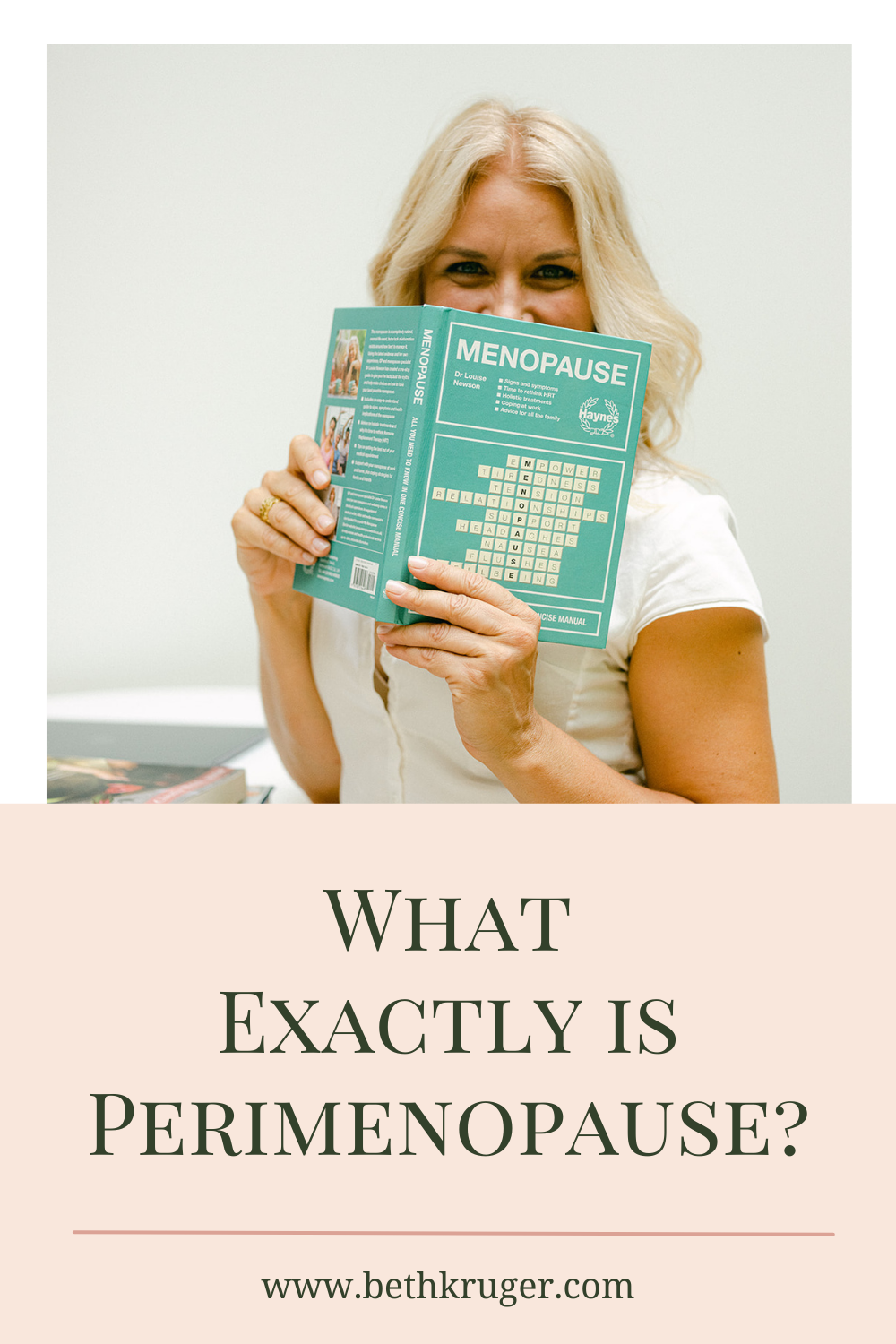What Exactly is Perimenopause?
Hey there! I want to start with a quick little introduction. My name is Beth Kruger–and in case you are just finding this post online, or are searching for more info about perimenopause–I want to tell you a bit more about what makes me qualified to discuss women’s health and hormones. If you know me already–you may not know my education or background–so I will give you a quick overview. I have been a Childbirth Educator, Lactation Counselor, Miscarriage Support Group Leader, Prenatal and Postnatal Yoga Teacher and Teacher Trainer for almost two decades. I currently facilitate Wellness Retreats for Women Over 40 and coach women through the challenges of this transitional time of life. I am most passionate about helping women navigate the uniquely female aspects of life. My current focus is on The Menopause, but started my female-focused- obsession with childbirth, pregnancy, lactation, and fertility back in 2004.
I do what I do quite simply, because I believe women deserve more. They deserve more education about their bodies, so they can advocate for themselves, and make informed choices about the care that they receive for all of life’s transitions like menstruation, pregnancy, childbirth, and yes–menopause.
What is Perimenopause anyway?
There are three different phases that define The Menopause. The first one is Perimenopause, which is actually the time when you begin having symptoms of loss of estrogen—this phase can last for up to 20 years (but typically lasts between 8-10 years); the second is Menopause which is technically defined as the single year of not having a period. Post-menopause are the years after this full year of cessation of the menstrual cycle.
Arguably, the most difficult time for most women is the perimenopausal phase of the menopause. It can last the longest and there is so much fluctuation with our hormones– and the symptoms that come with that. I want to focus my attention on this phase in this post because the dysregulation that we experience is often very difficult to manage with everything else happening in our lives.
Hormones affect our body in so many ways. The primary hormones involved in menopause are estrogen, testosterone, and progesterone. Estrogen and Testosterone affects our brain, and is responsible for regulating our mood, body temperature, and maintaining memory and cognition. Testosterone regulates sex drive, can improve mood, concentration, memory, and sense of wellbeing. The reproductive system on the other hand, is controlled by estrogen and progesterone, which maintains a menstrual cycle and lubricates the vagina, it also prepares the uterus (womb) for supporting the body during pregnancy. Estrogen stimulates the growth of our breasts during puberty, while it also protects the arteries in and around the heart. The bones, muscles and joints are also affected by estrogen that stimulates bone growth, maintains strength, and lubricates the joints and testosterone by improving bone growth and increasing strength and muscle mass.
Here are some of the symptoms of perimenopause–take a deep breath before reading–it’s a long list. Don’t be afraid!!
Brain fog
Mood changes
Memory problems
Low Motivation
Poor concentration
Migraines and headaches
Dry skin
Itchiness
Acne
Wrinkles
Altered sense of smell
Dry eyes
Facial hair
Burning mouth
Dry mouth
Hair changes (thinning and dryness)
Brittle nails
Hot flushes
Night sweats
Breast pain
Digestive problems
Weight gain
Loss of libido
Vaginal dryness
Menstrual periods occur less often and eventually stop
Frequent urination
Urinary pain
Incontinence
Joint pain
Osteoporosis
Muscle stiffness
These symptoms do not present in all women, and vary in severity for all women.
The response of hormonal fluctuations are very individualized, and unique.
WHAT WE CAN DO ABOUT IT
There are ways that we can manage the symptoms of perimenopause and thankfully, many of them can be achieved with minimal to no medications and augmented with lifestyle changes. Some of these include diet, exercise, supplements, meditation, mindfulness, reducing anxiety, prioritizing rest, and things like acupuncture and yoga. Therapy which includes CBT or Cognitive Behavioral Therapy is very helpful in accepting and managing the emotional and mental difficulties that can present themselves. Lastly is HRT which now is made much safer with the use of bioidentical hormones made from wild yams. It has mild risks for some patients, (the slightly increased risk of breast cancer, clots in the veins and stroke is no higher than that of a woman who drinks one to two alcoholic drinks per day), and many other possible benefits (reduced risk of cardiovascular disease, lower risk of osteoporosis).
If you would like more information about these ways to manage perimenopause, follow me on social media, or better yet–sign up for my mailing list. I also have a 6 month group program starting in September of 2022 to take a group of women through this transformational time of life. Click here if you would like to learn more about my programs for women over 40.










